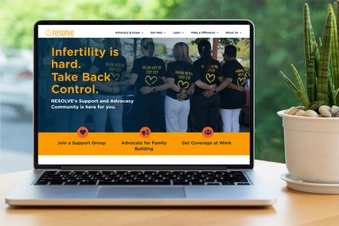Self-Care Tips for When You’re Going Through IVF

Try New Ways to Soothe Stress
Stress doesn’t make IVF or freezing eggs less likely to work. But it makes the process feel harder and can sap your physical and mental energy. There are lots of ways to ease stress and comfort both your body and mind throughout treatment. Some popular IVF stress-busters include:
- Acupuncture
- Guided imagery
- Journaling
- Massage therapy
- Listening to music
- Yoga

Clear Your Calendar
Keeping track of IVF treatment protocols and staying on top of your emotional health can make it tricky to balance other areas of your life. Ease the pressure when preparing for or going through a cycle by putting off big projects, curbing social and professional obligations, and getting help where you can. For example, you might turn down extra work or hire out chores like laundry and cleaning.

Consider Counseling
The mental challenges of IVF – such as balancing hope and setbacks along the way – can be complex. Ask your provider for a referral to a licensed mental health counselor. (The American Society for Reproductive Medicine also keeps a list.) Look for a therapist who focuses on people with fertility challenges. Another good choice is a mental health professional who offers cognitive behavioral therapy and has training in treating trauma.

Find Online Support
Social media and virtual communities are good ways to connect and share with people on similar journeys, and IVF is no different. Organizations, including RESOLVE, which is run by the National Infertility Association, host online support groups tailored to different ways of family building, including IVF and egg freezing. Some are professionally led, while others are peer-led, meaning a person in the group guides the discussion.

Don’t Spend Too Much Time Online
Support groups can be very helpful, especially by reminding you that you’re not going through IVF alone. Don’t rely on the internet too much, though. Not only does it spread misinformation along with the truth, but a study found that people who dwelled too much on online info and chat boards, so that they came across the same info over and over, felt worse.

Release What You Can’t Control
It’s natural to wish you had more control over your fertility treatment, such as the number of eggs or viable embryos or the outcome of a cycle. Since this isn’t possible, a more useful channel for your energy is to focus on what you can control. For example, you might:
- Strive to maintain a certain attitude or mindset.
- Zero in on your go-to stress-busters.
- Work out coping strategies with your partner.

Tap an IVF App
Fertility-focused apps offer tools such as relaxation techniques, meditations, and affirmations to help you de-stress, stay upbeat, and even sleep. Some apps even customize self-care programs to different stages of your treatment. See what others recommend, or do an app search to find them.

Praise the Positives
Even as the IVF or fertility treatment path isn’t always within your control, you’re doing a lot. Give yourself ample credit and honor the successes, improvements, and lifestyle upgrades you make through the process, such as:
- Cutting out alcohol and nicotine
- Going to counseling to boost your mental health
- Sticking with exercise routines or meditation habits

Set a Timer for IVF Talk
Especially before starting a cycle, stay on the same page with your partner by setting a certain time amount each day to talk about IVF or egg freezing. You might shoot for about 20 minutes to discuss expectations of each other, decide if you’ll both attend appointments, talk about how you’re feeling about it, or anything else. Then table the talk for the day and focus on other things going on in your life.

Take It Step by Step
Fertility treatments bring lots of things to do, learn, discuss, and decide. Break the sometimes-daunting lists into easy-to-manage bites. For example, if your protocol calls for at-home injections, focus on only that until you get the hang of it. Then move on to the next task on the list.

Delay Sharing News
Family and friends will be eager to hear results and news about your IVF treatment or other fertility procedures. There’s nothing wrong with taking some time to get used to new information before sharing it, though. Consider giving yourself a buffer by telling others to expect news on a day that’s after the actual day you expect to know results.

Keep Doing What You Love
Don’t forget about things you enjoyed doing or exploring before IVF or other fertility treatment, such as movie watching, crafts, or gaming. Chances are you’ll still get as much pleasure from these activities as you did before. This includes exercise, too. Whether you like to practice yoga or shoot hoops, ask your doctor what’s safe to keep doing through different phases of treatment.
Show Sources
IMAGES PROVIDED BY:
- iStock/Getty Images
- iStock/Getty Images
- iStock/Getty Images
- iStock/Getty Images
- E+/Getty Images
- Moment/Getty Images
- Stone/Getty Images
- E+/Getty Images
- iStock/Getty Images
- iStock/Getty Images
- DigitalVision/Getty Images
- blue jean images/Getty Images
SOURCES:
Society for Assisted Reproductive Technology: “Preparing for IVF: Emotional Considerations.”
American Society for Reproductive Medicine: “Stress and Infertility.”
COPE (Centre of Perinatal Excellence): “Looking After Yourself During IVF.”
Human Fertilisation and Embryology Authority: “How to Thrive and Not Simply Survive During Fertility Treatment.”
Society of Behavioral Medicine: “How to Cope with the Stress of IVF.”
RESOLVE: The National Infertility Association: “Find a Support Group.”
BMC Psychology: “Too much time? Time use and fertility-specific quality of life among men and women seeking specialty care for infertility.”